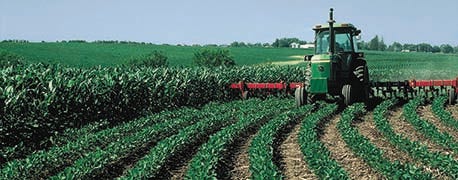
The dreaded 'M' word is “mechanical”—as in mechanical weed control—using a row-crop cultivator to remove weeds from fields.
While driving to a field plot in Webster County last week Iowa State University Extension weed management specialist Bob Hartzler saw a land roller being used in a field. His first thought: "If we have time to roll fields, why is there such resistance to the suggestion of mechanical weed control?"

WEED WEAPON: To stay ahead of weeds, farmers need to use a diverse weed control strategy which may include a cultivator. Cultivation helps avoid development of herbicide-resistant weeds and is an inexpensive way to control weeds that escape broadcast herbicide treatment.
“Most farmers who are my age probably have memories of long days on the tractor with a cultivator, a task that required undivided attention to avoid epidemics of cultivator blight,” says Hartzler. “As more effective herbicides were introduced in the mid-1980s the widespread use of cultivators became a thing of the past. Today, with the rapid spread of herbicide resistant weeds, is it time to reconsider our aversion to this practice? Should we return to using the cultivator, along with herbicides, in our weed control programs?”
Cultivating can take advantage of modern technology
Technology has not revolutionized mechanical weed control as happened with chemical weed control over the past 30 years. “However, using a cultivator today doesn’t need to be the dreaded practice of the past,” says Hartzler.
“Advancement in mechanical weed control for row crops comes in the form of automatic steering technology rather than cultivator design,” he notes. “Research has shown that automatic steering allows cultivators to be operated at twice the speed as when manual steering is used, maintaining the same levels of weed control and crop yield. Nearly as important is the elimination of the fatigue associated with the practice.”
Annual ISU weed control guide has helpful recommendations
In the ISU publication” 2016 Herbicide Guide for Weed Control In Corn and Soybeans”, which is available for downloading from the ISU website weeds.iastate.edu, ISU Extension weed management specialist Mike Owen and colleague Bob Hartzler provide recommendations for managing weed resistance to herbicides.
They advise farmers to use a diversity of weed management tactics including the use of soil-applied herbicides along with postemergence herbicides for weed control. In the past few years, Owen and Hartzler have seen an increase in the use of soil-applied herbicides by farmers, herbicides that provide residual control. There’s also been an occasional sighting of a row-crop cultivator being used in Iowa fields.
Rapid rise in resistant weeds is reason to consider a cultivator
While he’s not suggesting a return to the days where nearly all acres received at least one pass of a cultivator, the rapid rise of resistant weeds warrants a re-evaluation of this management tool, says Hartzler. “Fields or portion of fields that have persistent weed problems can be targeted for cultivation,” he notes. “The use of multiple effective herbicide groups can help manage herbicide resistance, but alternative tactics are essential. Mechanical weed control is one of the simplest alternative tactics to place into the current production system.”
Wallaces Farmer magazine ran an article in 1996 on row-crop cultivating, and how it was a weed control practice that was still being used by many Iowa farmers along with herbicides. The article cited information and advice from ISU Extension weed control specialists who had recently revised an ISU Extension publication titled “Cultivation: An Effective Weed Management Tool.” The authors who prepared that four-page ISU Extension bulletin 20 years ago were ISU Extension weed management specialist Bob Hartzler and ISU Extension ag engineer Mark Hanna, both of whom are still hard at work on the ISU staff today.
Cultivating for weed control was still popular in 1996
The Wallaces Farmer article and the ISU publication were written in 1996 and the introductory paragraphs cited a survey taken in 1994. Here’s what it said:
“Although more than 95% of Iowa row crop acres are treated with herbicides, cultivation remains popular with Iowa growers. In 1994, more than 70% of the state’s corn acres and 50% of soybean acres were cultivated to control weeds. However, most acres also were broadcast with herbicides, and not many growers applied herbicides in a band, a method that uses fewer chemicals and reduces the farm operator’s exposure to chemicals. In 1994, only 17% of the herbicides used on Iowa corn acres and 9% of the herbicides used on Iowa soybean acres were applied in a band. This publication answers some of the most common questions about reliance on cultivation for inter-row weed control. It also addresses other factors such as time, weather conditions, erosion control and cost that enter into decisions about weed management.”
Why you may want to go back to doing some cultivating
That 1996 ISU Extension publication is still available today online and can be downloaded as a pdf. Click on Cultivation: An Effective Weed Management Tool - Extension Store store.extension.iastate.edu/.../Cultivation-An-Effective-Weed-Man...You’ll find this trip down memory lane to be interesting and useful information.
About the Author(s)
You May Also Like




